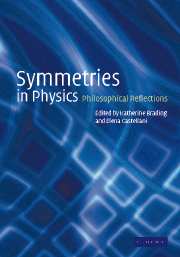Book contents
- Frontmatter
- Contents
- List of contributors
- Preface
- Copyright acknowledgements
- 1 Introduction
- Part I Continuous symmetries
- 2 Classic texts: extracts from Weyl and Wigner
- 3 On continuous symmetries and the foundations of modern physics
- 4 The philosophical roots of the gauge principle: Weyl and transcendental phenomenological idealism
- 5 Symmetries and Noether's theorems
- 6 General covariance, gauge theories, and the Kretschmann objection
- 7 The interpretation of gauge symmetry
- 8 Tracking down gauge: an ode to the constrained Hamiltonian formalism
- 9 Time-dependent symmetries: the link between gauge symmetries and indeterminism
- 10 A fourth way to the Aharonov–Bohm effect
- Part II Discrete symmetries
- Part III Symmetry breaking
- Part IV General interpretative issues
- Index
3 - On continuous symmetries and the foundations of modern physics
Published online by Cambridge University Press: 08 October 2009
- Frontmatter
- Contents
- List of contributors
- Preface
- Copyright acknowledgements
- 1 Introduction
- Part I Continuous symmetries
- 2 Classic texts: extracts from Weyl and Wigner
- 3 On continuous symmetries and the foundations of modern physics
- 4 The philosophical roots of the gauge principle: Weyl and transcendental phenomenological idealism
- 5 Symmetries and Noether's theorems
- 6 General covariance, gauge theories, and the Kretschmann objection
- 7 The interpretation of gauge symmetry
- 8 Tracking down gauge: an ode to the constrained Hamiltonian formalism
- 9 Time-dependent symmetries: the link between gauge symmetries and indeterminism
- 10 A fourth way to the Aharonov–Bohm effect
- Part II Discrete symmetries
- Part III Symmetry breaking
- Part IV General interpretative issues
- Index
Summary
As far as I see, all a priori statements have their origin in symmetry.
H. WeylSymmetry principles have moved to a new level of importance in this century and especially in the last few decades: there are symmetry principles that dictate the very existence of all the known forces of nature.
S. WeinbergIntroduction
It is difficult to overstate the significance of the concept of symmetry in its many guises to the development of modern physics. Indeed one could reasonably argue that twentieth-century physics with its pillar achievements of successful physical theories of spacetime/gravitation and the electromagnetic and nuclear interactions merits calling that century the ‘Century of Symmetry’. For symmetry played a key part in each of these developments. Of particular significance are symmetries described by continuous (Lie) groups of transformations. Such symmetry groups play a central role both in our current understanding of fundamental physics and in various attempts to go beyond this understanding. Today such continuous symmetries are often assigned a, if not the, fundamental role in the worldview of modern physics. The precise nature of this role, though, is not entirely unambiguous. Just what significance – physical, philosophical, and otherwise – is to be ascribed to the preeminent role of such symmetry groups in fundamental physics?
This paper aims to provide a brief and necessarily selective survey of the historical development of the place of continuous symmetries in physical theory.
- Type
- Chapter
- Information
- Symmetries in PhysicsPhilosophical Reflections, pp. 29 - 60Publisher: Cambridge University PressPrint publication year: 2003
- 20
- Cited by



